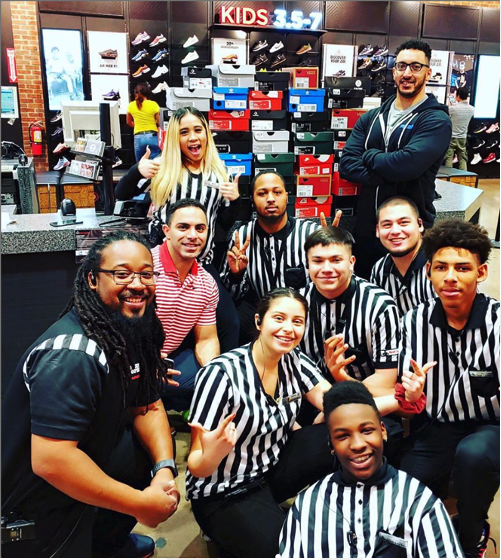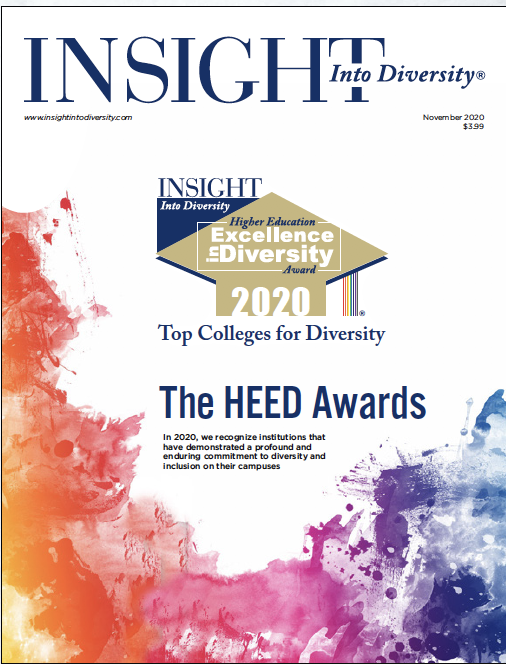FORT WORTH – Instilling hope and confidence in young children can come in many forms. But for some children being confident in their appearance, especially their shoes, helps boost their self-esteem more than one may think.
“Growing up our clothes and our shoes contributed to us not wanting to go to school and not doing well,” said Sam Sayed, a first-year medical student at the TCU and UNTHSC School of Medicine.
That idea is what led Sam and his brother Sharif, both Arlington natives, to launch a nonprofit in November 2018 called Dayna’s Footprints to give young schoolchildren the chance to walk into a shoe store and live out their sneaker dream.
“We felt like that was the kind of change we needed growing up to kind of level the playing field,” Sam said. “We thought we could do something to help instill confidence in young people.”
The nonprofit organization is named after the brothers’ late sister, Dayna Sayed, and is dedicated to changing the lives of underserved, young Texans through confidence-building, empowerment and fitness. Dayna Sayed, who was Sam and Sharif’s older sister, lost her life to gun violence in a drive-by shooting on March 8, 1997 when she was 16. At the time, Sam was 11 and Sharif was 9.
“She was very much like a mother figure to us because we lost our mother to asthma when I was 3 years old and Sharif wasn’t even 2 yet,” Sam said.
Before that tragic event, Dayna had gotten her first summer job. She saved up enough money to buy her younger brothers and other siblings brand new pairs of NIKE sneakers.
It was the very first pair of notable footwear any of them had received, according to Sam.
“But we can remember clearly what kind and I can remember what color mine were. It was almost one of her lasting impressions on us,” Sam said. “We like to say that giving these shoes away is kind of building an army of people walking in Dayna’s Footprints.”
From November 1 through January 1, the nonprofit raises money through their website that is used to give as many underserved children as possible their first taste of confidence through the gift of a high-quality pair of shoes.
“When we first started, our goal was so small,” Sam said. “We figured if we could get a few pairs of shoes for some local kids at Foster Elementary in Arlington that we attended when Dayna bought us those shoes that would be great.”
Little did they know the need for a basic necessity like a decent pair of sneakers was far greater than just a handful of students.
During a conversation with one of his former elementary school teachers Sam realized that getting a few pairs of shoes for only one or two students, who might live in a household with multiple siblings might send the wrong message to their siblings.
Following that conversation, Sam contemplated ways he could help raise more money.
The Sayed brothers have been life-long advocates of the importance of exercise as a part of daily wellness and well-being. Sam decided to leverage their following on social media to help spread the word about what they were doing for Foster Elementary.
They were able to raise exponentially more funds by creating a weightlifting challenge on social media to lift one million pounds of total weight volume during the entire month of November. Shortly after they began to post their results their friends and family, as well as local businesses and others, took notice and shared their support by donating and reposting their own daily weightlifting goals on social media.
“At first we thought we were in over our heads but it really lit a fire under us and we said we have to post every day.” Sam said. “We ended up raising about $3,000 for the kids at Foster Elementary.”
Now, with Sam being a medical student at the Fort Worth medical school, the students, faculty and staff have rallied around the Dayna’s Footprints initiative to help donate sneakers to even more students in Tarrant County.
Dayna’s Footprints formed a partnership with the Fort Worth medical school to expand the initiative to benefit the Como, Stop 6/Eastside, and Northside/Diamond Hill neighborhoods in Fort Worth. The medical school currently has 120 students divided into six different Learning Communities that work within those communities in Fort Worth.
This year, they will be striving for enough donations to buy 120 pairs of shoes for schoolchildren in those communities, along with participating in the One Million-Pound Weightlifting Challenge themselves.
“A lot of those kids come from the same background that I come from,” said Toni Igbokidi, a first-year medical student at TCU and UNTHSC School of Medicine. “The hopes that we all have to help with Dayna’s Footprints has been contagious among us. It gives us a chance to really put our best foot forward and help our community.”
The Sayed brothers will also continue to give to students at their former elementary school, Fosters Elementary in Arlington.
“I’m excited because I’m actually surrounded by a school of medicine that really wants us to succeed so we’re excited by this new challenge,” Sam said.
The Fort Worth medical school’s Learning Communities will work together to formulate and execute their own unique fundraising plans for their assigned communities using social media.
“I wanted to go to a medical school where we are in a position to help and where it’s almost our duty to help others,” said Mary Howerton, a first-year medical student at TCU and UNTHSC School of Medicine. “This is really just one way that this medical school is helping and putting an emphasis on us getting out into the community and figuring out their needs.”
The fundraising effort will also include a One Million-Steps Challenge on social media throughout the entire month of December. The Sayed brothers have posted workout plans to help anyone participating in the plan to reach the million-pound weightlifting goal in November and the million-step goal in December on the nonprofits’ website.
Everyone participating in the challenges on social media will be asked to use the hashtag #120for120 to document their progress in the Million-Pound Weightlifting Challenge and the One Million-Steps Challenge. Also, you can be a sponsor and have your company’s logo on the Dayna’s Footprints t-shirt that will be given to those who sign up for the One Million Steps Challenge.
In mid-January the Sayed brothers will gather all of the children from the communities they’ve supported and let them buy whichever pair of sneakers they would like from a local Foot Locker retailer.
“It’s not about what you have it’s about what you give and that’s what Dayna taught us,” Sam said.
How to Donate to Dayna’s Footprints
- You can donate any amount to the Dayna’s Footprints Initiative at any time from November 1, 2020 through January 1, 2021.
- Use this link to donate: https://bit.ly/2IuoHob
- If you’re interested in signing up for a sponsorship with Dayna’s Footprints during the One Million-Steps Challenge in December you can email: MDStudentAffairs@tcu.edu for more information.
How to Participate on Social Media
- The One-Million Pound Weightlifting Challenge runs from November 1 through November 30 using the hashtag #120for120 on your social media posts. You can download the weightlifting plan and progress tracker using this link: https://bit.ly/36sFXm4
- The One Million-Steps Challenge runs from December 1 through December 31 using the hashtag #120for120 on your social media posts. You can download the step plan and progress tracker using this link: https://bit.ly/38D5WKc
For more information on Dayna’s Footprints
- Follow them on Instagram @daynasfootprints
- Or visit their website: https://www.daynasfootprints.com/


 As a recipient of the annual Health Professions HEED Award — a national honor recognizing U.S. colleges and universities that demonstrate an outstanding commitment to diversity and inclusion — TCU and UNTHSC School of Medicine will be featured, along with 45 other recipients, in the December 2020 issue of INSIGHT Into Diversity magazine.
As a recipient of the annual Health Professions HEED Award — a national honor recognizing U.S. colleges and universities that demonstrate an outstanding commitment to diversity and inclusion — TCU and UNTHSC School of Medicine will be featured, along with 45 other recipients, in the December 2020 issue of INSIGHT Into Diversity magazine.